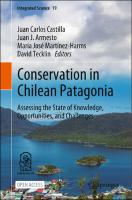Conservation in Chilean Patagonia
Assessing the State of Knowledge, Opportunities, and Challenges
Contributor(s)
Castilla, Juan Carlos (editor)
Armesto Zamudio, Juan J. (editor)
Martínez-Harms, María José (editor)
Tecklin, David (editor)
Language
EnglishAbstract
Chilean Patagonia, located at the southwestern tip of South America, is one of the last regions on earth where highly intact environments predominate. With a coastline that extends along some 100,000 km of fjords, channels, and islands, it has one of the world´s most extensive marine-terrestrial interfaces. Local place-based and Indigenous cultures and management practices are a vital presence across the region, while the long and rich history of conservation efforts have resulted in officially protected areas covering over 50% of the land and 41% of the coastal-marine area. However, Chilean Patagonia is increasingly facing anthropogenic pressures associated with increased infrastructure and access, salmon aquaculture, extractive industries, and the spread of invasive exotic species. Despite widespread recognition that Chilean Patagonia represents a unique global reservoir of socio-natural heritage, to date there has been no region-wide assessment of the scientific evidence of the conservation status of its ecosystems or the priorities for their effective conservation. Conservation in Chilean Patagonia: Assessing the state of knowledge, opportunities, and challenges is the first book to gather and synthesize the available scientific and socio-environmental information related to Patagonian conservation. It presents the collaborative work of 68 researchers and local experts, representing a range of specialties and perspectives, including: biology, ecology, socio-ecology, fisheries, aquaculture, anthropology, economics, geography, tourism, cryosphere, oceanography, climate and global change. The book’s 18 chapters focus on the status of key ecosystems and conservation tools, and provide recommendations toward the construction of a renewed, inclusive, and integrated conservation agenda for the Chilean Patagonian region. It provides an essential primer for anyone interested in the future of this ecologically vital region, as well as lessons on interdisciplinary collaboration and integrated analysis of conservation issues useful for conservation practitioners and scholars. This is an open access book. This book is a translation of an original Spanish edition. The translation was done with the help of artificial intelligence (machine translation by the service DeepL.com). A subsequent human revision was done primarily in terms of content, so that the book will read stylistically differently from a conventional translation.
Keywords
Ecology; Limnology; Oceanography; Biodiversity; Marine-terrestrial InterfaceDOI
10.1007/978-3-031-39408-9ISBN
9783031394089, 9783031394072, 9783031394089Publisher
Springer NaturePublisher website
https://www.springernature.com/gp/products/booksPublication date and place
Cham, 2023Imprint
Springer International PublishingSeries
Integrated Science, 19Classification
Conservation of the environment
Ecological science, the Biosphere
Biogeography
Biodiversity


 Download
Download Web Shop
Web Shop